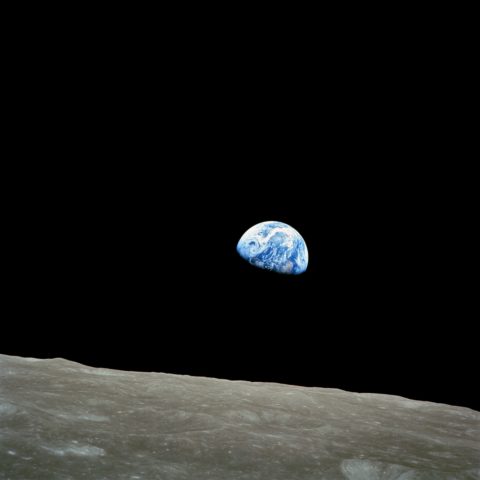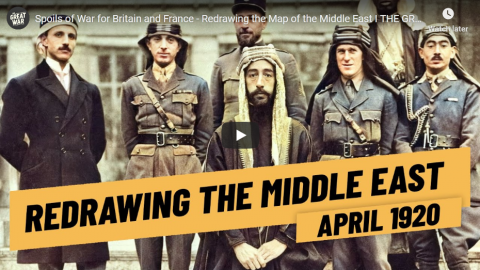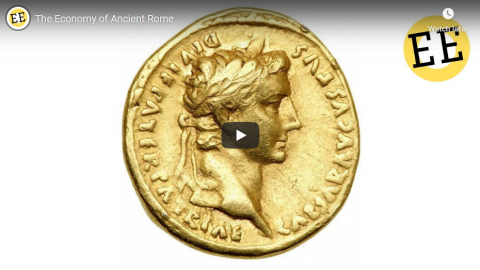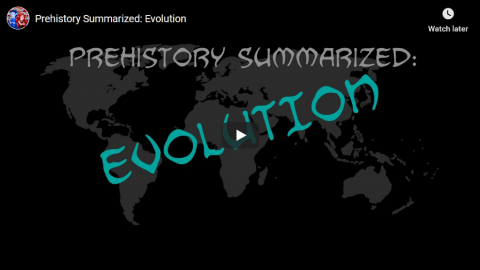The Great War
Published 25 Apr 2020Sign up for Curiosity Stream and Nebula – and get 40% off annual plans right now: https://curiositystream.com/thegreatwar
100 years ago at the conference of San Remo, one thing became clear: Great Britain and France wanted control over the Middle East. Justified by the fighting in the previous years and painted as “liberators” of the Middle Eastern minorities, the new map of the Middle East emerged – under the cover of the League of Nations Mandate system.
» SUPPORT THE CHANNEL
Patreon: https://www.patreon.com/thegreatwar
Merchandise: https://shop.spreadshirt.de/thegreatwar/» SOURCES
Karsh, Efraim & Karsh, Inari, Empires of the Sand: The Struggle for Mastery in the Middle East 1789-1923, (Cambridge, MA : Harvard University Press, 1999)“Dans Le Levant” Le Temps, August 31, 1919 issue, https://gallica.bnf.fr/ark:/12148/bpt…
Lloyd George, David, Memoirs of the Peace Conference, (New Haven : Yale University Press, 1939) vol. 2
“Mounted Rifles Units” New Zealand History, https://nzhistory.govt.nz/war/aucklan…
Paris, Timothy J. Britain, The Hashemites and Arab Rule 1920-1925, (London : Frank Cass, 2003)
Provence, Michael, The Last Ottoman Generation and the Making of the Modern Middle East, (Cambridge : Cambridge University Press, 2017)
O’Neill, Robert, Official History of Australia in the War of 1914–1918, Volume VII – The Australian Imperial Force in Sinai and Palestine, 1914–1918, (Australian War Memorial, 1941)
“King-Crane Commission Digital Collection” Oberlin College Library. http://dcollections.oberlin.edu/cdm/s…
» SOCIAL MEDIA
Instagram: https://instagram.com/the_great_war
Twitter: https://twitter.com/WW1_Series
Reddit: https://reddit.com/r/TheGreatWarChannel»CREDITS
Presented by: Jesse Alexander
Written by: Jesse Alexander
Director: Toni Steller & Florian Wittig
Director of Photography: Toni Steller
Sound: Toni Steller
Editing: Toni Steller
Mixing, Mastering & Sound Design: http://above-zero.com
Maps: Daniel Kogosov (https://www.patreon.com/Zalezsky)
Research by: Jesse Alexander
Fact checking: Florian WittigChannel Design: Alexander Clark
Original Logo: David van StepholdA Mediakraft Networks Original Channel
Contains licensed material by getty images
All rights reserved – Real Time History GmbH 2020
April 27, 2020
Spoils of War for Britain and France – Redrawing the Map of the Middle East I THE GREAT WAR 1920
The NFL may have a problem … everyone seems to have liked the virtual draft better than the “real” thing
It is usually difficult to muster much sympathy for the National Football League, but the record-setting popularity of the 2020 draft is a huge surprise:
The unique presentation of the 2020 NFL Draft established new all-time highs for media consumption in every category. With over 600 camera feeds from homes across the United States, all telecasts of the 2020 NFL Draft reached more than 55 million total viewers across Nielsen-measured channels over the three-day event, up +16% vs. 2019. An average audience of over 8.4 million viewers watched all three days of the 2020 NFL Draft across ABC, ESPN, NFL Network, ESPN Deportes, and digital channels easily breaking the previous high of 6.2 million viewers in 2019 (+35%).
Each day of the 2020 NFL Draft established new highs as an average audience of over 15.6 million viewers watched Round 1 on Thursday (+37% vs. 2019), over 8.2 million viewers watched Rounds 2 & 3 on Friday (+40% vs. 2019), and over 4.2 million viewers watched Rounds 4-7 on Saturday (+32% vs. 2019).
All seven rounds of the 2020 NFL Draft were presented across ABC, ESPN, and NFL Network – the second straight year that The Walt Disney Company partnered with the National Football League to offer a multi-network presentation of the entire Draft.
“I couldn’t be more proud of the efforts and collaboration of our clubs, league personnel, and our partners to conduct an efficient Draft and share an unforgettable experience with millions of fans during these uncertain times,” said NFL Commissioner Roger Goodell. “This Draft is the latest chapter in the NFL’s storied history of lifting the spirit of America and unifying people. In addition to celebrating the accomplishments of so many talented young men, we were pleased that this unique Draft helped shine a light on today’s true heroes – the healthcare workers, first responders, and countless others on the front lines in the battle against COVID-19. We are also grateful to all those who contributed to the NFL family’s fundraising efforts.”
“This year’s NFL Draft clearly took on a much greater meaning and it’s especially gratifying for ESPN to have played a role in presenting this unique event to a record number of NFL fans while supporting the league’s efforts to give back,” said ESPN President Jimmy Pitaro. “The success of this year’s Draft is a testament to the unprecedented collaboration across the NFL, ESPN, and The Walt Disney Co. in the midst of such a challenging time.”
The unique situation of having the vast majority of televised sports activities suspended clearly made a big difference — when you’re the only game in town, you can expect a wider audience — but the online draft seems to have been popular even among people who normally would have tuned in for the event anyway.
The Economy of Ancient Rome
Economics Explained
Published 26 Apr 2020Ancient Rome was perhaps the most significant ancient civilisation to have existed throughout history, the empire lived for over 1000 years and in that time, it gave us the foundations for our modern society. Democracy, a court based legal system, Latin languages and alphabet, three course meals, and perhaps it was one of the first modern economies to move beyond a simple agrarian empire and develop things like modern banking, lending, taxation and yes even financial crisis as we know them today.
In the same way that scholars study a dead language like Latin to discerned the foundation of meaning in our modern dialects economists can study the histories of ancient civilisations like Rome to determine basic economic functions in a time before modern financial systems could skew results and Rome was perhaps the most developed case study we could look at.
#rome #economics #recession
Patreon – https://www.patreon.com/EconomicsExpl…
Discord – https://discord.gg/7kM7Tw9
Enquiries – loungejita@gmail.com
References –
Morley, N., 2002. Metropolis and hinterland: the city of Rome and the Italian economy, 200 BC-AD 200. Cambridge University Press.
Temin, P., 2006. “The economy of the early Roman Empire”. Journal of Economic Perspectives
Temin, P., 2017. The Roman market economy. Princeton University Press.
Garnsey, P., Hopkins, K. and Whittaker, C.R. eds., 1983. Trade in the ancient economy
Brown, P., 2012. Through the Eye of a Needle: Wealth, the Fall of Rome, and the Making of Christianity in the West, 350-550 AD. Princeton University Press.
Braund, D.C., 1983. Gabinius, Caesar, and the publicani of Judaea. Klio
Articles
http://penelope.uchicago.edu/Thayer/E…
Entrepreneurs beyond the atmosphere
Doug Bandow reacts to Donald Trump’s executive order that begins to clear the way for private enterprise in space:

Taken by Apollo 8 crewmember Bill Anders on December 24, 1968, at mission time 075:49:07 (16:40 UTC), while in orbit around the Moon, showing the Earth rising above the lunar horizon.
Despite the current chaos caused by the coronavirus, Washington still must consider the future. Which explains the president’s new executive order that would allow private resource development on the moon and asteroids. It clearly rejects the “common heritage of mankind” rhetoric deployed by the United Nations on behalf of the Law of the Sea Treaty, which four decades ago created a special UN body to seize control of seabed resources.
The Future of Space Exploration
The EO issued earlier this month explained that
Successful long-term exploration and scientific discovery of the Moon, Mars, and other celestial bodies will require partnership with commercial entities to recover and use resources, including water and certain minerals, in outer space.
The measure began the process of revising an uncertain legal regime which currently discourages private sector development.
The administration pointed to the 1979 Agreement Governing the Activities of States on the Moon and Other Celestial Bodies (known as the Moon treaty) and the 1967 Treaty on Principles Governing the Activities of State in the Exploration and Use of Outer Space, including the Moon and Other Celestial Bodies (typically called the Outer Space Treaty). Neither is friendly to entrepreneurs or explorers with a commercial bent.
In response, the president announced that
Americans should have the right to engage in commercial exploration, recovery, and use of resources in outer space, consistent with applicable law. Outer space is a legally and physically unique domain of human activity, and the United States does not view it as a global commons. Accordingly, it shall be the policy of the United States to encourage international support for the public and private recovery and use of resources in outer space, consistent with applicable law.
Space is a Long-Term Prospect
The document’s main directive is for the Secretary of State, in cooperation with other agencies, to “take all appropriate actions to encourage international support for the public and private recovery and use of resources in outer space.” The secretary is to “negotiate joint statements and bilateral and multilateral arrangements with foreign states regarding safe and sustainable operations for the public and private recovery and use of space resources.”
Obviously, the administration’s attention is directed elsewhere at the moment. However, the potential benefits of turning to space are significant. The value of scientific research is obvious and continues to drive government agencies such as NASA. Launch services and space tourism have caught the interest of private operators. Such activities offer fewer legal and practical difficulties than attempting to establish some sort of long-term presence in the great beyond.
More complex development of space is a longer-term prospect. However, that makes it even more imperative to encourage innovation by creating institutions and incentives that encourage responsible development of what truly is the “final frontier.”
Prehistory Summarized: Evolution
Overly Sarcastic Productions
Published 5 Dec 2015Third video in a week? Good lord, what have they been feeding us?
Anyway, Blue’s back, this time with more history! The exciting conclusion to the three-part video series! Our “Return Of The King”! Our “Return Of The Jedi”! Our… wow, a lot of “part three”s are the return of something or other, aren’t they? Let’s pretend this is “The Return Of Bruce”.
QotD: H.L. Mencken’s literary theory
As for me, my literary theory, like my politics, is based chiefly upon one main idea, to wit, the idea of freedom. I am, in brief, a libertarian of the most extreme variety, and know of no human right that is one-tenth as valuable as the simple right to utter what seems (at the moment) to be the truth. Take away this right, and none other is worth a hoot; nor, indeed, can any other long exist. Debauched by that notion, it follows necessarily that I can be only an indifferent citizen of a democratic state, for democracy is grounded upon the instinct of inferior men to herd themselves in large masses, and its principal manifestation is their bitter opposition to all free thought. In the United States, in fact, I am commonly regarded as a violent anti-patriot. But this is simply because most of the ideas upon which American patriotism bases itself seem to me to be obviously sentimental and nonsensical — that is, they have, for me at least, no intelligible relation to the visible facts. I do not object to patriotism when it is logically defensible. On the contrary, I respect it as a necessary corollary to the undeniable inequality of races and people. Its converse, internationalism, appears to me to be almost insane. What an internationalist says, stripping it of rhetoric, is simply that a lion is no more than a large rat.
H.L. Mencken, “Private Reflections”, The Smart Set, 1922-12.







